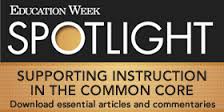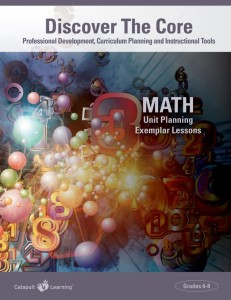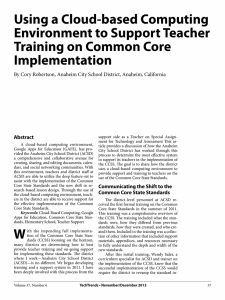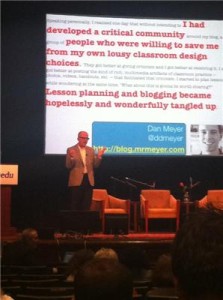Teacher Traing Articles
TEACHER-TRAINING SCHOOLS UNDER PRESSURE TO PREPARE FOR COMMON CORE
By Sara Carr and Danielle Dreilinger
Hechinger Report 9/30/13
12 teachers who are being asked to adjust their teaching styles and curricula to ensure students learn the Common Core standards. The people who teach the teachers are also under the gun.
But as the controversial standards take root, there’s disagreement over whether teacher-training programs are doing enough to prepare aspiring educators for the dramatic changes they will  encounter in classrooms across America.
encounter in classrooms across America.
Some organizations, such as the National Council on Teacher Quality, have criticized teacher-training programs for responding too slowly to the new standards. “There’s no evidence that this (the Core) has made its way into the thinking about how to train new teachers,” said Kate Walsh, the council’s president. A June report from the organization, surveying about 1,100 institutions, concluded that only 11 percent of elementary programs and about one-third of high school programs appear to prepare candidates who can successfully teach the Common Core.
The standards, which most states have adopted, do not constitute a curriculum. But they do lay out general English and math skills students should learn by different stages, such as being able to count to 120 by the end of first grade. Schools that follow the standards should also adhere to general-educational principles, such as prioritizing analytical-essay writing over first-person narratives.
Moreover, with no centralized curriculum being written by the Louisiana Department of Education, teachers play a larger role than they may be accustomed to in turning those standards into lesson plans.
University-based teaching programs
In Louisiana, leaders of traditional, university-based teacher-preparation programs say they are making significant changes in line with the Core: Emphasizing literacy across the curriculum; asking their candidates to design more assessments with multi-step math problems; and teaching them to identify appropriately challenging texts.
“They are all supposed to be making changes to what is happening in their curriculum,” said Jeanne Burns, the Louisiana Board of Regents’ associate commissioner for teacher and leadership initiatives.
 At Tulane University, teacher candidates must now write sample lesson plans that are aligned with the Core, said Linda McKee, director of the teacher preparation and certification program. Prospective teachers start with an overview course called Education in a Diverse Society, in which they receive an introduction to the new standards. In their second class, the students attempt to put those standards into practice while writing their first lesson and unit plans; they continue to explore the standards in greater depth as they advance through their methods courses. “There’s not a lesson they write without addressing the Common Core,” said McKee.
At Tulane University, teacher candidates must now write sample lesson plans that are aligned with the Core, said Linda McKee, director of the teacher preparation and certification program. Prospective teachers start with an overview course called Education in a Diverse Society, in which they receive an introduction to the new standards. In their second class, the students attempt to put those standards into practice while writing their first lesson and unit plans; they continue to explore the standards in greater depth as they advance through their methods courses. “There’s not a lesson they write without addressing the Common Core,” said McKee.
At Southeastern Louisiana University in Hammond, instructors ensure teacher candidates understand the major shifts under Common Core, said Cynthia Elliott, the interim head of the department of teaching and learning. The professors point out, for instance, the emphasis on non-fiction in the standards and teach their students to evaluate the complexity of a text (a crucial skill for teachers under the Common Core).
Elliott said many of the standards are aligned with the practices and principles education professors have long prioritized. “We’ve been advocating a greater emphasis on literacy across the curriculum for years,” she said.
At the same time, she worries about teachers’ stamina for change in a state that’s introducing the Common Core, the new “Compass” teacher-evaluation system, and a new set of standardized tests, the PARCC series, all within a short time frame. “I think it’s been very hard on teachers in the field,” said Elliott. “They are rolling out so many things at one time that it has really impacted the teaching profession … I hope it doesn’t have a backlash where we don’t have enough certified teachers.”
Louisiana’s non-traditional teacher prep
Louisiana has authorized six alternative-certification programs such as Relay Graduate School for teachers whose bachelor’s degrees are not in education, and New Orleans has a relatively large proportion of teachers who are involved in nontraditional programs such as Teach for America (TFA). These, too, are diving into Common Core.
But with their participants employed full-time as classroom teachers, and with individual districts developing their own curricula, both Relay and TFA say they’re trying to complement what their  teachers are doing in their home schools.
teachers are doing in their home schools.
Greta Anderson, a 5th grade math teacher at New Orleans’ Dibert elementary school, has helped her peers adjust to the new Common Core curricular standards. (Photo: FirstLine schools)
Still, both the New Orleans and South Louisiana Teach for America chapters are offering Common Core workshops, even though Jack Carey, New Orleans chief operating officer, is thinking of them as a belt-and-suspenders measure.
“We know that some school districts do a great job of providing a lot of locally driven support” on Common Core, agreed Michael Tipton, executive director of the South Louisiana office.
Some TFA corps members are using the Literacy Design Collaborative, a tool the state is making available to support lesson planning in English language arts. Some are part of the state’s teacher-leader program that turns teachers into Common Core experts for their schools. Carey is leaning on some teacher-leaders to give workshops for corps members.
Carey said corps members were deeply engaged in the standards. “I think in general there’s such a hunger – the more they know about these rigorous expectations for kids, the more excited they get,” he said.
 Second-year corps member Kelsey Kavanagh, who teaches high school English in St. Bernard Parish, has signed up for a TFA Common Core workshop. But she says she’s learned the most so far by participating in resources available outside TFA, such as the Literacy Design Collaborative. This summer she worked on her district’s Common Core curriculum-writing team, “a collaborative group of educators really delving into the standards and rewriting the curriculum to meet those standards,” she said.
Second-year corps member Kelsey Kavanagh, who teaches high school English in St. Bernard Parish, has signed up for a TFA Common Core workshop. But she says she’s learned the most so far by participating in resources available outside TFA, such as the Literacy Design Collaborative. This summer she worked on her district’s Common Core curriculum-writing team, “a collaborative group of educators really delving into the standards and rewriting the curriculum to meet those standards,” she said.
Relay Graduate School of Education is the newest of the six alternative-certification programs in Louisiana, offering a one-year master’s degree that’s a mix of online and in-person classes to just over 30 participants. They are at varying levels of familiarity and comfort with the standards, said Dean Jennifer Francis, but elementary teachers generally seem to be more informed.
The majority of the Relay curriculum is focused on general pedagogy, not content knowledge, but teachers take daylong workshops on “Understanding the Common Core for Mathematics” and similar topics.
Francis said Relay staff met with the leaders of all its participants’ schools to find out what they were doing on Common Core, and their approaches seemed to be lining up well. Staff said it helped that since Relay started in Common Core states New York and New Jersey, they’re familiar with both the standards and the EngageNY curriculum that some Louisiana schools are using.
“They see a really solid connection between what we’re asking them to do and what their schools are asking them to do,” Francis said. “The expectation is that what we’re doing in class will translate into the classroom immediately.”
The national perspective
Across the country, most teacher-preparation programs scarcely mention the Common Core in recent course syllabi, said Julie Greenberg, a senior policy analyst at the National Council on Teacher Quality. “In half the programs we see not a smidgeon of reference, direct or indirect, to anything Common Core related.”
Greenberg said her organization would update the survey over the next year, focusing on 100 programs nationwide that had course syllabi available for a more-detailed analysis. The researchers will look in the syllabi for key words that suggest an attempt to teach Common Core-related skills and values, such as lessons on text-complexity analysis (the standards go into considerable detail on how teachers should determine which grade level to teach a text; following the guidelines, classics like “Narrative of the Life of Frederick Douglass” would be considered more appropriate for middle school than high school); teaching history through a literary focus; identifying informational texts; or forming evidence-based arguments.
“A lecture on Common Core is not enough,” Greenberg said. “Talking about it is easy. Doing it takes practice.” But she intends to be “generous” in her interpretation of which changes might have been prompted by the Common Core.
prompted by the Common Core.
Leaders of education-training programs say the Common Core is incorporated throughout classes and cannot always be easily detected in course or lesson titles. “The professors don’t put in their syllabus, ‘This is part of the Common Core,’” said McKee. “It’s just ingrained.”
Southeastern University’s Elliott said the new standards might prompt some changes in course titles over time, but only after a lengthy curriculum-review process that can take up to a year. “In the short term, we’ve revised the content in our courses,” she said.
The current debate aside, some education leaders believe colleges of education need to do a better job ensuring their graduates know how to create and revise curricula — no matter what happens with the Common Core.
“(They) do not do enough on teaching candidates the fundamentals on building curricula and critiquing them,” said Andre Perry, the dean of urban education at Davenport University (who previously worked at the University of New Orleans and Loyola). “Students should leave a program knowing how to … teach and adjust the Common Core and the next curriculum to come along.”
TOO MUCH MISSING FROM TEACHER TRAINING PROGRAMS
By Esther J. Cepeda
Chicago Tribune – 7/1/2013
Maybe someday, I’ll go back to school and re-experience teacher training decades after the current movement to bring rigor to such programs has finally taken hold in higher education.
Perhaps then I could marvel at changes in the currently laughable system of identifying and preparing the K-12 educators compared to 2003, when I started working toward my teaching certification and master’s in education.
But to illustrate how far we have to go, I’ll spare you the makes-you-want-to-tear-your-hair-out stories I regularly hear from teachers who are frustrated by the stupefying nature of their continuing professional-development classes or the poor training many new teachers get.
Instead, here are the words of a fairly recent graduate who wrote the Wall Street Journal in response to a news story about the National Council on Teacher Quality’s (NCTQ) first nationwide review of teacher preparation programs.
“I’m at the tail end of my fourth year of teaching high school and have come to realize that many of the classes that I sat through, and paid exorbitant amounts of money for, have had very little application in the classroom,” wrote Sonia Gerig of Oakdale, N.Y., testifying to the poor job that teacher prep programs do in training new educators.
“There were no classes on state and federal standards for content, there were no classes on how to manage a classroom with behavior issues or classes on how to design effective lessons, no classes on how to modify assignments to satisfy the accommodations on a student’s Individualized Education Plan without sacrificing quality of the assignment.”
I took my last graduate-level education course in 2009 and the quality of both the curriculum and instruction — not to mention the caliber of my classmates, most of whom were working educators — was so poor I wrote a formal complaint. It was an act of futility.
Here are the most alarming tidbits from NCTQ’s report, which makes clear why so many of our public schools are failing. According to its survey of 2,420 teacher preparation programs at the 1,130 institutions that prepare 99 percent of the nation’s traditionally trained new teachers, it is far too easy to get into a teacher preparation program.
 “Just over a quarter of programs restrict admissions to students in the top half of their class, compared with the highest-performing countries, which limit entry to the top third,” the study notes.
“Just over a quarter of programs restrict admissions to students in the top half of their class, compared with the highest-performing countries, which limit entry to the top third,” the study notes.
And three out of four elementary teacher preparation programs aren’t even teaching the methods of reading instruction that could substantially lower the number of children who never become proficient readers, perhaps from 30 percent to under 10 percent. “Instead,” the report says, “the teacher candidate is all too often told to develop his or her ‘own unique approach’ to teaching reading.”
OK, one more example in case you weren’t horrified enough about our current methods of putting new teachers into classrooms: “Just 7 percent of programs ensure that their student teachers will have uniformly strong experiences, such as only allowing them to be placed in classrooms taught by teachers who are themselves effective, not just willing volunteers.”
I can attest to the veracity of each of these claims and have tackled these issues and the absurdities of the multibillion-dollar teacher education industrial complex, which is described by NCTQ as an “industry of mediocrity.”
The real story here is not simply that teacher preparation programs stink — education experts have described them as lackluster and in need of work for years — but that we can finally say this for a fact.
Despite the open revolt from education program deans across the country who protested NCTQ’s efforts and denounced their rating methodology as flawed, now that the problems have been identified and quantified, energy can be put to fixing them.
NCTQ’s 2010 evaluation of Illinois’ teacher prep programs found that in addition to several other poor practices, the state’s test for prospective teachers was too easy to pass, subsequently allowing colleges to churn out countless unprepared teachers.
The findings drove real policy changes. In this most recent assessment, Illinois was found to have made significant progress just by raising the bar in state testing requirements for undergraduate admissions. If this can happen in the Land of Lincoln’s hotbed of entrenched education interests, there’s hope for every state.
Esther J. Cepeda is a columnist for the Washington Post Writers Group.
CAN TWITTER REPLACE TRADITIONAL PROFESSIONAL DEVELOPMENT?
Sarah Garland 8/1/2012
Hechinger Report
Twitter and Facebook might soon replace traditional professional development for teachers. Instead of enduring hours-long workshops a few times a year, teachers could reach out to peers on the Internet in real time for advice on things like planning a lesson (or salvaging a lesson that’s going wrong), overcoming classroom management problems, or helping students with disabilities.
Internet in real time for advice on things like planning a lesson (or salvaging a lesson that’s going wrong), overcoming classroom management problems, or helping students with disabilities.
Or, at least, that’s what a group of Internet-savvy educators who convened in New York City this week. Are hoping are hoping.
“Being connected [through social-networking sites] is an opportunity for growth anytime, anywhere,” said Steve Anderson, director of instructional technology for the Winston-Salem/Forsyth County Schools in North Carolina, speaking yesterday at the second annual #140edu conference, a reference to Twitter’s 140 character limit for tweets. A teacher can go on Twitter, he added, and “learn 10 new things.”
Traditional forms of on-the-job training for teachers have been much-maligned in recent years by experts and by teachers themselves. “Many times professional development is like herding cattle: We’re taking everybody in the same direction. We’re going to learn the same thing,” said Eric Sheninger, principal of New Milford High School in northern New Jersey.
For-profit companies, nonprofits and universities make lot of money providing training to schools, but little research exists on what types of professional development for teachers work best. Increasingly, schools and districts are adopting what experts say are more promising ways of training teachers that involve more coaching and teacher collaboration.
 But some educators who attended the #140edu conference want to push the envelope further, to make teacher training even more individualized and self-directed. Among the attendees were teachers and principals who keep blogs documenting their daily travails and successes in the classroom, which work as guideposts for others and forums where they can glean tips. Some have thousands of Twitter followers and Facebook friends.
But some educators who attended the #140edu conference want to push the envelope further, to make teacher training even more individualized and self-directed. Among the attendees were teachers and principals who keep blogs documenting their daily travails and successes in the classroom, which work as guideposts for others and forums where they can glean tips. Some have thousands of Twitter followers and Facebook friends.
Kyle Pace, an instructional technology specialist for the Lee’s Summit School District, near Kansas City, gave an example of how personal networks and crowd-sourcing on the Internet could improve on the old ways of training teachers:
“A teacher could be teaching a lesson on the Civil War. That lesson could bomb. They could go to their network, pose a question, and ask for a resource. In the next period they could have new resources, things to try immediately,” he said. “Traditional professional development can’t offer that immediacy of being a connected educator,” Pace added.
In-person interaction shouldn’t be completely discarded, however, said Sheninger, who says he has revolutionized his school partly through help from people he met via Twitter. “I value my face-to-face connections more than I do my virtual ones,” he said. “Technology flattens our ability to connect with people. It just makes things easier. It’s not the only way I connect with people.”
Indeed, at the conference, a room set aside for in-person mingling and chatting was often more crowded than the auditorium where panelists were giving their talks.

Recent Comments